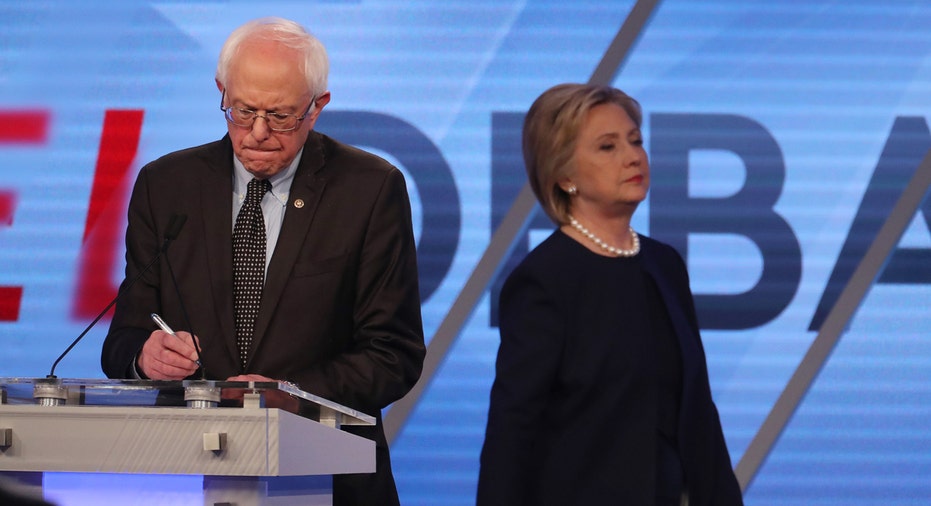Clinton, Sanders Split Contests in Oregon, Kentucky

Democrat candidates Hillary Clinton and Bernie Sanders each picked up primary wins on Tuesday in yet another demonstration of how divided the party is in the drawn-out national race to win the nomination for November's general election.
Clinton narrowly defeated Sanders in Kentucky, a state where she was not expected to win. Sanders bested her in Oregon, a state that played to his strengths.
In Kentucky, the two candidates will likely split the 55 delegates up for grabs. In Oregon, Sanders will take only a handful more of the 61 delegates that were awarded.
Clinton’s sizeable lead in delegates means it is likely she will eventually be her party's nominee, but she remains more than 100 delegates short of sealing the deal. The Democratic primary now hits a two-week lull, with the final set major contests, including California, scheduled for June 7.
Clinton, who spent the past two days campaigning in Kentucky, would like to lock up the nomination and turn her attention to the Nov. 8 general election and presumptive Republican nominee Donald Trump.
Trump has begun to organize his general election campaign. On Tuesday, he signed a joint fundraising agreement with the Republican National Committee. The agreement allows him to raise $449,400 from a single donor by splitting the funds between his campaign, the RNC and state Republican parties.
Trump, who eschewed donations in the political system through the primary, has thus far insisted on mostly self-funding his campaign. The shift to a more traditional fundraising approach could draw the ire of some supporters.
Trump, in an interview with Megyn Kelly that aired on Fox News Tuesday night, said he did have regrets about his actions during the Republican primary process.
"I could have used different language in a couple of instances, but overall I’m happy with the outcome," Trump said.
NEVADA STILL RANKLES
Sanders supporters became angry when Nevada state party officials chose to end their convention and block efforts to award the U.S. senator from Vermont more delegates than he initially won in the February caucus. Clinton won the caucus.
The Nevada incident was a warning about the potential for fireworks at July's Democratic National Convention in Philadelphia.
Clinton's campaign continued to express confidence that she would be able to unify the party.
"Hillary Clinton is grateful to the thousands of Nevadans who came out to participate in the caucuses and convention process," Clinton campaign manager Robby Mook said.
"She believes every voice should be heard and no one should be intimidated, harassed or threatened in this process. When the primary process is complete, our party must come together and ensure a Democrat is elected to serve as our next president," Mook said.
Sanders on Tuesday joined his supporters in criticizing the Nevada Democratic Party after Saturday's events.
One Sanders supporter threw a chair, unhappy about being blocked in a rules vote that was part of the effort to help the senator win more delegates to the national convention. Others drew chalk graffiti on a party building, while the state's party chairwoman has been receiving death threats.
Sanders framed Nevada's incident as a warning.
"If the Democratic Party is to be successful in November, it is imperative that all state parties treat our campaign supporters with fairness and the respect that they have earned," Sanders said in a statement on the Nevada incident.
Sanders - who said he condemns violence and personal harassment of individuals - leveled some of the same complaints his supporters did, arguing that state party Chairwoman Roberta Lange did not allow a headcount on a disputed rules change. He also argued that 64 delegates to the state convention were not given a hearing before being ruled ineligible.
THREATS OF VIOLENCE
The state party disputed the Sanders campaign's interpretation of the events. It said some delegates did not show up at the convention and others were disqualified because they were not registered as Democrats in time.
"The Sanders campaign is continuing to be dishonest about what happened Saturday and is failing to adequately denounce the threats of violence of his supporters," the Nevada Democratic Party said in a statement.
Sanders supporters began circulating a picture of Lange on the internet that included her cellphone number and encouraged others to contact her to express their unhappiness.
Lange said on MSNBC she had been receiving death threats, including many containing vulgar language. Public messages sent to her Twitter account included a barrage of derogatory statements.
MSNBC played some of the voicemails, including one saying “people like you should be hung in a public execution.”
“What you heard is a few of the thousands of emails and texts and Facebook messages and Twitter messages that I’ve gotten," Lange said on MSNBC. "Threats to my family, to my grandson, to my husband.
Sanders' continued presence in the race is prompting concerns among Clinton allies that he will damage her ability to take on Trump and hurt her in the fall.
But Sanders supporters shrug off that worry, arguing that Trump is such a flawed candidate that Clinton will easily dispatch with him if she faces him in the Nov. 8 election.
Clinton's camp seems to agree.
"Ultimately, we are confident that the passion and energy from the primary will be united in a common purpose — to move forward the ideals of our party and keep the White House out of Donald Trump’s hands," her campaign manager Mook said.
(Additional reporting by Luciana Lopez in New York and Doina Chiacu, John Whitesides and Patricia Zengerle in Washington; Editing by Caren Bohan, Jonathan Oatis, Leslie Adler, Michael Perry and Paul Tait)



















